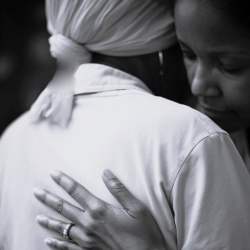Miscarriage is a tough and deeply personal experience that can leave lasting emotional scars. The loss of a pregnancy is heartbreaking, bringing a wide range of intense emotions like sadness, anger, confusion, and guilt. This period can be incredibly isolating for those affected, as they navigate their grief and process the loss of their unborn child. If someone you know has gone or is going through this, it’s completely normal to feel unsure about what to say or do. The instinct to want to help but not know how to approach the situation is common.
Offering support and comfort is important, but it requires a lot of care and empathy. It’s important to approach the situation with sensitivity, acknowledging their pain without trying to fix it or rush them through their grief. Remember, there is no “right” way to grieve, and everyone’s journey is different. In this post, we’ll be sharing some ways to help a family member or friend through this difficult time, ensuring they feel supported and understood.
Understanding the Impact
A miscarriage is the loss of a pregnancy before the 20th week. It’s quite common, with about 10-20% of known pregnancies ending this way. Many miscarriages happen before a woman even knows she’s pregnant, so the actual number is likely higher. Despite being common, the emotional impact of a miscarriage can be overwhelming. For many, the excitement and dreams about the future abruptly end, leaving a void filled with sorrow. It’s not just the loss of a pregnancy but also the loss of hopes and plans for the future. This can lead to a profound sense of grief, similar to losing a loved one.
Physical Impact
The body undergoes various changes during pregnancy, and the sudden end can be a shock to the system. Symptoms can include heavy bleeding, cramping, and hormonal shifts, all of which can add to the emotional strain. Physical recovery can vary from person to person, but it’s important to follow healthcare provider recommendations to ensure proper healing.
Long-Term Effects
The impact of a miscarriage can extend well beyond the immediate aftermath. It can affect mental health, potentially leading to anxiety, depression, or post-traumatic stress disorder (PTSD). The fear of future pregnancies and the potential for another loss can also weigh heavily on those who have experienced a miscarriage. The emotional toll can also strain relationships, as partners might grieve differently or struggle to support each other.
Understanding the impact of miscarriage is key to providing effective support to someone going through this difficult experience. By acknowledging the emotional, physical, and cultural dimensions of miscarriage, you can offer more empathetic and meaningful support. Whether it’s listening without judgment, offering practical help, or respecting their grieving process, your compassion can make a significant difference in their healing journey.
What to Say
- Express Sympathy: Start by acknowledging their loss. Simple statements like, “I’m so sorry for your loss,” or “I can’t imagine how difficult this must be for you,” can show that you care. These words let them know their pain is seen and acknowledged.
- Offer to Listen: Sometimes, the best thing you can do is just listen. Phrases like, “I’m here if you want to talk,” or “Feel free to share whatever you’re comfortable with,” can be very comforting. Listening without judgement allows them to express their feelings openly.
- Acknowledge Their Pain: Validating their feelings is important. You can say, “It’s okay to feel sad and grieve,” or “Your feelings are completely valid.” Recognizing their emotions helps them feel understood and supported.
What Not to Say
- Avoid Platitudes: Phrases like, “Everything happens for a reason,” or “It’s part of a bigger plan,” can be hurtful, as they may imply that their grief isn’t justified. These statements, even if well-meaning, can seem dismissive of their pain.
- Don’t Offer Unsolicited Advice: Refrain from suggesting what they should do next, unless they specifically ask for advice. Everyone’s journey through grief is unique, and what works for one person may not be right for another.
- Don’t Compare Losses: Avoid comparing their experience to someone else’s, even if you think it might help. Each person’s grief is their own, and comparisons can often minimize their individual experience and pain.
- Avoid Minimizing Their Loss: Stay away from statements that might seem dismissive, like, “At least it happened early,” or “You can always try again.” These can unintentionally downplay their grief. Remember, the loss of a pregnancy, no matter the stage, is significant.
how to Offer Support
- Practical Help: Offer to help with everyday tasks. Cooking meals, running errands, or helping with other kids can provide much-needed relief. Practical support can ease some of the burdens during a time when they feel overwhelmed.
- Respect Their Process: Understand that grieving takes time. Be patient and offer ongoing support, not just immediately after the miscarriage. Grief can be a long process, and your continued presence can provide much-needed stability and comfort.
- Stay in Touch: Keep checking in on them because grief doesn’t have a set timeline. Even simple messages like, “I’m thinking of you,” can mean a lot.
- Encourage Professional Help: If your friend is struggling a lot, gently suggest they might benefit from talking to a therapist who specializes in grief or pregnancy loss. Organizations like Still A Mum, The Miscarriage Association and Share Pregnancy & Infant Loss Support offer resources and support.
Emotional and Psychological Support
- Create a Safe Space: Make it clear they can express their feelings without fear of judgment. Let them know whatever they’re feeling is okay, whether it’s sadness, anger, confusion, or a mix of emotions.
- Share Memories: If your friend named their baby or has specific memories of their pregnancy, encourage them to share those memories. This can be an important part of the healing process.
- Offer Distraction: Sometimes, a little distraction can be helpful. Invite them to do activities they enjoy, whether it’s watching a movie, going for a walk, or doing something creative.
- Respect Their Boundaries: Grief is personal, and everyone has different ways of coping. Respect their need for space if they require it. Don’t push them to talk or engage in activities if they’re not ready.
Physical Recovery and Health
- Support Their Physical Health: Encourage them to follow their healthcare provider’s recommendations for physical recovery. This may include rest, nutrition, and any necessary medical follow-ups.
- Understand Physical Symptoms: Be aware that physical symptoms can accompany a miscarriage, such as bleeding, cramping, and hormonal changes. Offer empathy and understanding as they navigate these challenges.
- Provide Information: If they’re open to it, share reputable resources about miscarriage recovery, such as Mayo Clinic or the American Pregnancy Association.
Long-Term Support
- Remember Important Dates: Anniversaries, due dates, and other significant dates can be particularly difficult. Acknowledging these dates can show that you remember and care.
- Offer Continued Support: Again, grief doesn’t have a set timeline. Continue to offer support in the months and years following the miscarriage. This can include regular check-ins, invitations to social activities, and ongoing empathy and understanding.
- Be Patient: Healing from a miscarriage can be a long and complex process. Be patient and supportive as they navigate their emotions and recovery.
Additional Resources
- Mayo Clinic: Provides information on physical recovery and planning for future pregnancies.
- American Pregnancy Association: Offers comprehensive guides on understanding miscarriage and emotional recovery.
- Tommy’s: A UK-based charity that funds research into miscarriage and provides support for those affected.
- Miscarriage Association: Offers support and information for those affected by miscarriage, including resources for partners and families.
- National Infertility Association (RESOLVE): Provides support and resources for individuals facing infertility and pregnancy loss.
Supporting a someone after a miscarriage is about offering empathy, understanding, and practical help. By listening and validating their feelings, avoiding dismissive comments, and providing ongoing support, you can help them navigate through this challenging time. Remember, the most important thing is to be there for them in whatever way they need.




